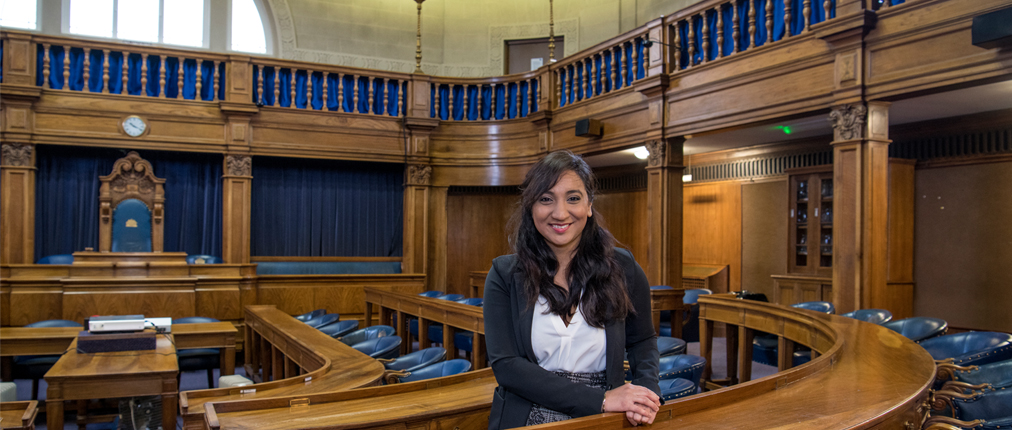Hartley News Online Your alumni and supporter magazine
Southampton Connects Alumni speaks to Satvir Kaur (BA History and Politics, 2007), a leading local councillor in Southampton who credits her time at the University with raising her aspirations and setting her on a new path.
As a supporter of our recently-launched Black, Asian and Minority Ethnic Staff Network, Satvir is also passionate about accessing equal opportunities and runs a mentoring scheme for students.
What attracted you to Southampton?
It was a massive battle for me to go to university, for many traditional cultural reasons. My sisters and I were the first girls to actually go from my community and I could only go if I stayed living at home in Southampton where I was born and raised. The University was right on my doorstep but also had a great reputation for studying.
How did you adjust to University life and what did you learn from your time here that you have taken with you in your career?
I think it is fair to say that my University experience was different to a lot of my peers. I was living at home and was working three jobs to help pay for my studies. What hit me was University life, meeting different people from all backgrounds including international students. That was that learning that had the most impact, the social element of it really opened up my horizons and my aspirations grew just working and studying alongside different people. The fact that I was there alongside people who had that awareness from a young age of achieving whatever they wanted and there were no barriers to that, was an enlightening experience and it was instilled in me during my time at University.
What are your memories of your time here?
Living in Hartley Library, doesn’t everyone? I remember the teaching was exceptional; it was really, really brilliant. I absolutely loved my course, if I could do it again then I would. I think the approach at Southampton was very much to encourage our own thinking and developing our own investigation, particularly in the seminars. I thoroughly enjoyed my time there.
Did your course set you on the path into local politics?
I actually left promising myself I would never enter politics! Although I was very interested in politics I never saw myself getting into party politics. I went on to do a law degree elsewhere and although it was interesting that wasn’t something I wanted to pursue either so I took up a publishing job in London. Having said that, one of the modules on my degree was called The Making of Englishness, an area examining national identity that I champion politically at local and national level along with working closely with think tanks. I don’t think, as a country, we have got to grips with that. The seeds of my interest in that area came from my time at the University of Southampton.
So, how did you get into politics?
By accident really! In the run up to the 2010 elections, I bumped into John Denham who was our MP at the time while volunteering at a Vaisakhi parade. Although a Labour supporter all my life, I was never an active member but he suggested I get involved and a few weeks later one of his team gave me a call. My first day helping out involved me meeting the-then Prime Minister Gordon Brown and it went from there. It was again someone from John’s team who suggested I ran for a seat on the local council and despite it being described as a seat that was ‘unwinnable’ – I won it!
Since your election in 2011 you have risen through the party and now hold the portfolio for Communities, Culture and Leisure along with Chair of the Southampton and Romsey Labour Party. What do you still enjoy about your job?
For me I find it extremely rewarding, I wanted to change the world and in my own little way, I am. Whether that is getting someone a dropped kerb so they don’t have to walk further to get into their home with their shopping; helping someone at my clinic who is having to choose between heating their home or feeding their child; working to bring events like the Common People festival to the city; or setting up initiatives with amazing organisations like John Hansard Gallery to reduce reoffending; or transforming a library service so that they don’t have to close, I wake up most days really thankful for what I do.
Do you think more could be done to encourage black and minority ethnic people into local and national politics?
For me it is an aspirational thing. I always thought politics wasn’t for people like me. I don’t want my nieces and nephews growing up thinking that, about anything. I would agree there are equal opportunities now but I would still argue that access to those opportunities can be a barrier.
If there is something we could do as a society to improve that, then that is a good thing. Universities can play such a big role by going into our schools and really raising those aspirations, as mine were.
Anything I can do to help with that then I will. Personally I have a mentoring scheme aimed at young people, particularly from deprived backgrounds interested in my area of work, many of whom have been students. I am also pleased to support the staff network that has been set up at Southampton and any events that promote awareness like Black History Month for example. I think there is a gap in the understanding of how black and ethnic people have contributed to this country historically and I am always advocating how it takes lots of people from a different community to make cities like Southampton so amazing.
There should also be a challenge back to political organisations and groups at all levels. Unless they themselves try harder to bring in people from all backgrounds, you will always have people like me looking at the political system thinking ‘things like that just aren’t for people like me’.

